What is brand 500 concrete and what is it used for?
Currently, no construction site can do without the use of liquid concrete mix, the scope of which starts from laying a strip or monolithic foundation and ends with the manufacture of reinforced concrete monolithic frame of the building or pouring monolithic interfloor floors.
In addition, a liquid concrete solution of various brands is widely used for factory manufacturing of various structural parts of the building and bearing elements of building structures.
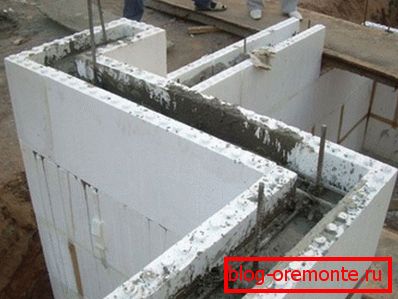
Concrete in individual construction
In order to help the reader understand the variety of various grades of building concrete mixes, this article will look at the concrete of the 500 mark, and also indicate its basic properties and scope of application.
In addition, along with a description of heavy concrete, the main characteristics of D500 aerated concrete for erecting walls, as well as exterior and interior walls in a building under construction will be affected here.
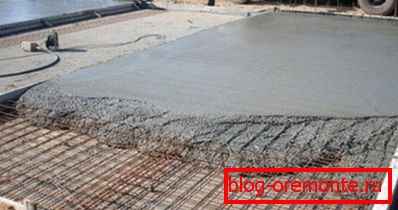
Scope of application
By itself, concrete brand M500 is a mixture of granite rubble, river sand, cement and water in a certain ratio, which after solidification forms a high-strength monolithic massif capable of sustaining very high static, dynamic and hydrodynamic loads for a long time.
Due to the very high strength of concrete, low setting time, and the ability to freeze under water or at low temperatures, such a solution is most often used to build critical nodes that will be used in difficult and extreme conditions, such as building bridges, subway tunnels, hydraulic structures constructions and so forth
As for individual construction, heavy concrete of the M500 grade is inappropriate in this case for several reasons.
- For the manufacture of high-strength concrete solution brand M500 used selected granite rubble, a large number of high-quality cement and various modifying additivesTherefore, the price of such a solution is significantly higher than the cost of less high-strength building mixtures.
- This solution has a very fast setting time., therefore, should be immediately used immediately after delivery to the construction site.
- After solidification, such a solution has a very high margin of safety.which is not required during the construction of civilian objects of individual housing construction.
- The technology of manufacturing high-strength concrete is quite complicated, therefore it is unacceptable for self-preparation with your own hands directly on the construction site.
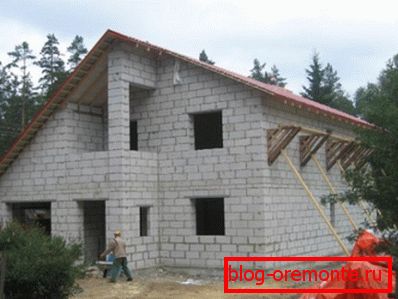
Ultralight Concrete
Speaking about the use of brand 500 in individual construction, in fact, this concept refers to the use of structural parts made of ultra-light porous gas-filled concrete. The most commonly used in civil engineering are aerated concrete blocks D500, which are used for the construction of external walls and internal partitions in the construction of low-rise or monolithic frame buildings.
This building material, as a rule, is not reinforced and does not have high strength, therefore it cannot be used for the manufacture of supporting elements, as well as supporting structures of multi-storey buildings.
However, in some cases, its use is most appropriate, due to some distinctive qualities.
- A small specific weight allows to reduce the design load on the supporting elements of the structure and the floor slab, and also eliminates the need to manufacture a powerful, deep-seated foundation.
- Low density and porous structure reduce the heat loss coefficient, and, accordingly, improve the insulating properties of the material.
- For the manufacture of gas-filled blocks consumes fewer building materials (sand, cement, lime), which reduces the final cost of the finished product.
- Due to its low weight, installation is greatly simplified, and special glue is used to connect gas-filled blocks with each other, which allows you to perform this work in a short time.
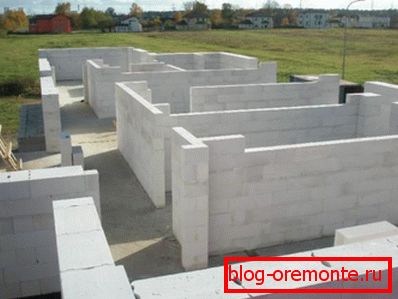
Tip! Glue for aerated concrete blocks is sold in the form of a dry construction mixture, which is made directly at the construction site. Before you prepare the glue you need to carefully read the instructions on the package.
Structural gas-concrete blocks
Structural gas-filled blocks are the most common type of building materials made of ultralight porous concrete. They are used for the construction of internal walls, for the construction of external and bearing walls of a building with a height of not more than three floors, as well as for the manufacture of internal walls in multi-storey monolith-frame buildings.
Aerated D500 or D900, having a closed porous structure, is used as the material for the manufacture of such blocks.
Gas-filled blocks may vary in size, method of execution, as well as various design features.
- The traditional block with flat edges resembles an ordinary brick in its shape, but it has a large size. It has high heat and sound insulation properties and is most often used for the construction of internal and external walls.
- Blocks with a groove-crest system and with hand grips on the end faces provide a more reliable grip of adjacent structural elements and simplify self-assembly.
- Gas-filled U-section blocks are used as permanent formwork for making hidden monolithic lintels, ligating supporting walls, as well as arranging a set of window and door openings.
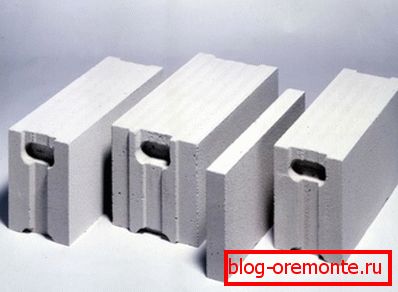
Tip! All types of cellular concrete are fragile materials, so in the process of natural shrinkage of the building on the walls, small cracks are allowed, which need to be fixed by smearing them with cement-sand mortar.
Thermal insulating foam blocks
In addition to construction, there are also gas-filled blocks of lower density, which, due to the low thermal conductivity of the material, are used as insulation of concrete floors or bearing walls of a building. For their manufacture used aerated concrete brand D200 or D300.
It should be remembered that the technological instruction and SNiP do not allow the use of such structural parts for the construction of supporting elements and supporting structures of the building.
Table 1 shows the comparative characteristics of the density and thermal conductivity of basic building materials.
| Construction material | Density, kg / m3 | Heat conductivity coefficient, W / (m · ° С) | |
| Dry condition | Operating humidity | ||
| Autoclave aerated concrete D500 | 500 | 0,12 | 0,14 |
| Керамзитобетон | 800 | 0,23 | 0,35 |
| Reinforced concrete | 2500 | 1,69 | 2,04 |
| Solid clay brick | 1800 | 0,56 | 0,81 |
| Hollow clay brick | 1000 | 0,26 | 0,44 |
| Full-bodied silicate brick | 1800 | 0,70 | 0,87 |
| Tree (pine, spruce) | 500 | 0,09 | 0,18 |
| Mineral wool | 150 | 0,042 | 0,045 |
| Styrofoam | 35 | 0,028 | 0,028 |

Conclusion
After reading this article, we can conclude that when mentioning the use of concrete brand 500 in individual construction, most likely means the use of structural parts made of gas-filled porous concrete with a density of 500 kg / m ?.
For more information on this issue, you can watch the video in this article or read similar materials on this subject on our website.